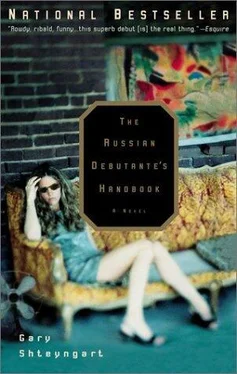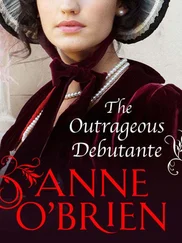Gary Shteyngart - The Russian Debutante's Handbook
Здесь есть возможность читать онлайн «Gary Shteyngart - The Russian Debutante's Handbook» весь текст электронной книги совершенно бесплатно (целиком полную версию без сокращений). В некоторых случаях можно слушать аудио, скачать через торрент в формате fb2 и присутствует краткое содержание. Город: New York, Год выпуска: 2003, ISBN: 2003, Издательство: Riverhead Books, Жанр: Современная проза, Юмористическая проза, на английском языке. Описание произведения, (предисловие) а так же отзывы посетителей доступны на портале библиотеки ЛибКат.
- Название:The Russian Debutante's Handbook
- Автор:
- Издательство:Riverhead Books
- Жанр:
- Год:2003
- Город:New York
- ISBN:0-7865-4177-6
- Рейтинг книги:4 / 5. Голосов: 1
-
Избранное:Добавить в избранное
- Отзывы:
-
Ваша оценка:
- 80
- 1
- 2
- 3
- 4
- 5
The Russian Debutante's Handbook: краткое содержание, описание и аннотация
Предлагаем к чтению аннотацию, описание, краткое содержание или предисловие (зависит от того, что написал сам автор книги «The Russian Debutante's Handbook»). Если вы не нашли необходимую информацию о книге — напишите в комментариях, мы постараемся отыскать её.
and
. The Russian Debutante’s Handbook Bursting with wit, humor, and rare insight,
is both a highly imaginative romp and a serious exploration of what it means to be an immigrant in America.
The Russian Debutante's Handbook — читать онлайн бесплатно полную книгу (весь текст) целиком
Ниже представлен текст книги, разбитый по страницам. Система сохранения места последней прочитанной страницы, позволяет с удобством читать онлайн бесплатно книгу «The Russian Debutante's Handbook», без необходимости каждый раз заново искать на чём Вы остановились. Поставьте закладку, и сможете в любой момент перейти на страницу, на которой закончили чтение.
Интервал:
Закладка:
“I understand,” Vladimir said with the same gravity, only inwardly he was excited, for he believed it to be a love note from his prostitute, and he was deeply interested in the kind of seductions she would deploy and in what form and language. He took the small, folded ribbon of purple paper from the barkeep, who immediately galloped off to the other end of the bar, and unfurled it. A carefully drawn gunsight stared back at Vladimir, and beneath in boxy letters the familiar bilingual legend:
It was signed collectively, “The Stolovan Skinheads.”
Vladimir did not say, “Ah…” He was on his feet and walking toward the exit. The soft flesh of prostitutes, the pungency of their perfume and hair, was an obstacle course he negotiated with partial success, saying along the way, “pardon, pardon, pardon…” But he was thinking, Skinheads? Where? Who? The workers? They have hair. A pace or two from the door he finally saw them out of the corner of his eye—the black military jackets, the camouflage pants, ankle-high boots; the faces didn’t even register.
Outside, the familiar darkness disturbed by smog and the distant grumble of dysfunctional Trabants, an empty dirtyard facing the rump of a low, gray municipal building, the only illumination provided by the light trailing from the bar’s open door. In front of him two skinheads appeared from different directions, both coming from outside his line of sight, coming together as if they were going to meld into a single unit, as if he was suffering from double vision and there was really only one set of gritted teeth, one pair of busted lips, and only one black swastika painted on an orange T-shirt below.
Vladimir turned around. The space between him and the bar door was rapidly filling up with young men and determined expressions; it was evident that the workers and the prostitutes in this town were not the only ones who formed identical cadres, for the enforcers of local ethnic purity resembled one another to the last detail. Perhaps they were all fathered by the same bald, slightly overweight man with his fists always squeezed by his side, and one eye permanently squinted as if against the oncoming glare of the African sun.
Then their ranks broke to admit one who was surely their leader—a head taller, broad-shouldered but thin, with a pair of contemporary wire-rims and the urgent, piercing gaze of a young German intellectual let loose in an American graduate program. The tall one looked down at Vladimir’s head as if it were a breeding ground for baby hydras and said, “Passport!”
Vladimir exhaled for the first time. He remembered, for some reason, that he didn’t have a Soviet passport where his nationality would be listed as “Jew,” and from this particular fact he allowed himself the idea of a loophole. No, it wasn’t going to end like this. An entire life, a special little creature, an existence whose precariousness was its very leitmotif, extinguished at the hands of morons! “No! No passport!” he said. “Groundhog!” he shouted in Russian, in the direction of the bar.
The leader looked toward his men. “Jaky jazyk?” he barked. This was similar enough to Russian for Vladimir to understand: “What language?”
“Turetsky,” one of the skinheads happily said, smashing a fist into his palm. Turkish.
The intellectual fixed his gaze on Vladimir once again. He was starting to work on a smirk of his own, which considerably united his appearance with those of his comrades. “You are from Arabia!”
Arabia. Arabia! Could it be they were looking for a different kind of Semite? “No Arabia!” Vladimir shouted, waving his hands dangerously close in the direction of the leader. “America! I am America!” He happily remembered the extremist fervor of some of his Zionist classmates in Hebrew school. “Arabia, tphooo! ” He spit—unfortunately, on his shoe. “Islams…” He brought a mock trigger to his head and shot himself, “Boom!” although really he ought to have been shooting somewhere else, in the direction of the imaginary Arab, perhaps. Laughter broke out among the ranks at this self-indicting gesture, but it quickly got lost amid a volley of inimical snorts and a tightening of the ethnic-cleansing cordon sanitaire around Vladimir. Some of the hooligans were already spreading their legs apart, the better to keep their balance during the one-serving pogrom to come.
“Look,” Vladimir said and, with hands shaking and vision blurred from the tears he could no longer control, tried to extricate his wallet from his jeans. “Give me a minute… Please, what will it hurt you… Look… American Express… American Express… And this is a New York State driver’s license. You gentlemen ever been to New York? I know plenty of skinheads there. We go raise hell in Chinatown sometimes…”
The leader examined Vladimir’s exhibits and then, in what Vladimir saw through his betraying tears as a foreboding gesture, put them into his own wallet, stepped back an inch, and nodded to the ground where he once stood.
“Please,” Vladimir said in Stolovan. He was ready to say it again.
A fist landed above Vladimir’s right eye, but before that pain was fully realized there was the sensation of flight and then the feeling of his body breaking up against the ground, his tailbone emitting a crack as the pain radiated outward from a hundred terminuses, and then a great cheer went up, although he didn’t understand the exact word (hurrah?), then a girder, it would seem, landed against his ribcage and then one, two more on the other side, flashing in bright childhood yellows then receding to darkness and the aftershocks of pure pain, and then someone had jumped on his clenched fist and— bozhe moi, bozhe moi —there was that cracking again, the cracking you could feel in the back of your mouth, the cheering again (hurrah?), Morgan… wake up in Prava, shto takoie? which language? pochemu nado tak? my God, not like this, svolochi! you have to breathe, nado dyshat’, breathe, Vladimir, and your mama will bring you… zhirafa prinesyot… a stuffed giraffe… ya hochu zhit’! I want to live! to continue to exist, to open your eyes, to run, to say to them, “No!”
“No!” Vladimir raised a broken fist into the air and swung it at a target that wouldn’t present itself. His eyes opened simultaneously and he saw two figures standing in the direct light of the bar. For a second his eyes focused, then unfocused, then, through an extraordinary ripple of pain charging through his spine like current, focused once more. He couldn’t make out their expressions exactly, only that Gusev was nodding, while the Groundhog was looking straight ahead. And then, Vladimir let his fist drop. He saw a boot’s wedge of steel making its way expressly toward his face and said, in two languages at the same time: “Come on.”
“Davai.”
36. IN HAPPIER TIMES
HE IS WALKINGfrom her dormitory; it is the first time they have slipped their hands into each other’s pants. He is walking through the town square, a meticulously planted conglomerate of trees, lawns, and flowerbeds, which the Midwestern college maintains to remind itself of its less progressive Eastern brethren. It is morning. The clouds extend practically to the tops of the leafless oaks and a light drizzle sweeps in out of nowhere as if to remind the pedestrian of what clouds are all about. And yet, in one of the vagaries of Midwestern weather, this overcast February morning suddenly achieves an unlikely springlike temperature, conveyed through a wind as warm as the gust of a hair dryer.
He is wearing a heavy brown overcoat bought by Mother in anticipation of this bedeviling climate. Today, unlike frigid yesterday, he has unbuttoned it to the hilt and stuffed his scarf in his pocket, ignoring his mother’s decades-old advice to “never let your guard down when warm weather suddenly appears, Vladimir. It is a silent killer, like venereal disease.” But Mother is nowhere in sight, and he is free to catch both cold and gonorrhea.
Читать дальшеИнтервал:
Закладка:
Похожие книги на «The Russian Debutante's Handbook»
Представляем Вашему вниманию похожие книги на «The Russian Debutante's Handbook» списком для выбора. Мы отобрали схожую по названию и смыслу литературу в надежде предоставить читателям больше вариантов отыскать новые, интересные, ещё непрочитанные произведения.
Обсуждение, отзывы о книге «The Russian Debutante's Handbook» и просто собственные мнения читателей. Оставьте ваши комментарии, напишите, что Вы думаете о произведении, его смысле или главных героях. Укажите что конкретно понравилось, а что нет, и почему Вы так считаете.












